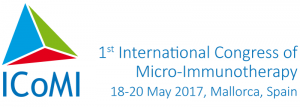1st International Congress of Micro-Immunotherapy (ICoMI 2017)
Immunomodulation and chronic diseases through the prism of autoimmunity:
new concepts, new perspectives
Dr. Pascal Mensah (Scientific Director of ICoMI 2017)
Palma de Mallorca, March 8, 2016 – The 1st International Congress of Micro-Immunotherapy will be held in Palma de Mallorca between 18-20 May, 2017. Scientists and healthcare professionals from around the world will meet on this occasion to share their experience on important topical issues related to basic discoveries and therapeutic innovations. As a matter of fact, chronic diseases offer an appropriate framework for reflection, allowing this Congress to open up new perspectives thanks to emerging concepts of autoimmunity.
Chronic diseases comprise a wide range of pathologies: autoimmune diseases, cancer, degenerative diseases, allergies, infections, inflammatory bowel diseases, cardiovascular diseases, metabolic disorders, etc. A better understanding of their development and progression represents a challenge for researchers, whereas practitioners are seeking to find long-term therapeutic solutions for their patients.
Since the immune system has become a common point of interest for researchers and practitioners, the therapeutic options offered by Immunomodulation will constitute one of the major topics of this congress. Within these new strategies, the use of low-doses seems the most promising; micro-immunotherapy and other therapeutic solutions based on immunomodulation, thus, may work in synergy with more conventional immunotherapies.
Auto-immunity: changing views and hypotheses
At first, different links between autoimmune diseases and viruses or bacteria were established, highlighting the fact that the immune system might mistake self-antigens with microorganisms, due to similarities between the two. This phenomenon is called molecular mimicry.
Later, another hypothesis defined auto-immunity as a result of different mechanisms: it was shown that tissue damages in certain autoimmune diseases were sometimes caused by a combination of an anti-pathogen reaction and a chronic inflammatory response, allowing self-antigens to externalize more easily and get in contact with immune system cells (phenomenon known as bystander activation).
In the 90’s, the hygienic theory emerged postulating a higher autoimmune risk due to an excess of hygiene, particularly in developed countries, where the lack of parasites and infections could alter the Th1/Th2 balance.
It had also been recognized for a number of years that genetic susceptibility could lead to autoimmune diseases in a propitious environment. This susceptibility may be related to mutations affecting the genes encoding for the HLA-molecules group that play a key-role in antigen presentation.
Furthermore, recent studies have shown the existence of communication problems between the innate and the adaptive immunity. This miscommunication could lead to the differentiation of lymphocytes towards the Th17 path; those cells are, nowadays, known to be majorly implicated in autoimmune processes. Toll-like receptors, which are responsible for the innate recognition of pathogens, might also be implicated in the pathogenesis of those diseases.
The new concept of autoimmunity: Tolerance, the essential function of barriers
Barriers refer to interfaces between the external world and the body (skin, respiratory system, intestinal mucosa…). These interfaces are responsible for identifying and discerning between what is beneficial and, thus, can access the body (nutrients, medicine, specific micro-organisms…), and what harms it and, thus, should be eradicated (pathogens: virus, bacteria…). These barriers ensure the mechanism of tolerance. If tolerance decreases, inflammatory reactions and inappropriate immune reactions will emerge, leading to chronic processes. In this context, the immune system is likely to select auto-reactive cells (T and B-lymphocytes). Therefore, chronicity implies a higher risk of autoimmune disorders.
In summary, auto-immunity can be defined as the result of a long-standing inflammatory process caused by a dysfunction of barriers. This concept may serve to explain not only autoimmune diseases but also various chronic diseases like cancer, metabolic disorders etc… Immuno-modulation, thus, offers new possibilities for the treatment of those diseases and enables us to look to the future with hope.
Bibliography
- Burton BR et al. Sequential transcriptional changes dictate safe and effective antigen-specific immunotherapy. Nat Commun. 2014 Sep 3;5:4741.
- Münz C et al. Antiviral immune responses: triggers of or triggered by autoimmunity? Nat Rev Immunol. 2009 Apr;9(4):246-58.
- O’Shea JJ, Ma A, Lipsky P. Cytokines and autoimmunity. Nat Rev Immunol. 2002 Jan;2(1):37-45.
- De Rosa V et al. Glycolysis controls the induction of human regulatory T cells by modulating the expression of FOXP3 exon 2 splicing variants. Nat Immunol. 2015 Nov;16(11):1174-84.
- Fasano A, Shea-Donohue T. Mechanisms of disease: the role of intestinal barrier function in the pathogenesis of gastrointestinal autoimmune diseases. Nat Clin Pract Gastroenterol Hepatol. 2005 Sep;2(9):416-22.
- Yang Z, Matteson EL, Goronzy JJ, Weyand CM. T-cell metabolism in autoimmune disease. Arthritis Research & Therapy. 2015;17(1):29.
- Klatzmann D, Abbas AK. The promise of low-dose interleukin-2 therapy for autoimmune and inflammatory diseases. Nat Rev Immunol. 2015 May;15(5):283-94.
- Lang HL et al. A functional and structural basis for TCR cross-reactivity in multiple sclerosis. Nat Immunol. 2002 Oct;3(10):940-3.
- Wills-Karp M, Santeliz J, Karp CL. The germless theory of allergic disease: revisiting the hygiene hypothesis. Nat Rev Immunol. 2001 Oct;1(1):69-75.
- Hadis U et al. Intestinal tolerance requires gut homing and expansion of FoxP3+ regulatory T cells in the lamina propria. Immunity. 2011 Feb 25;34(2):237-46.
- Charbonnier LM et al. Control of peripheral tolerance by regulatory T cell-intrinsic Notch signaling. Nat Immunol. 2015 Nov;16(11):1162-73.
- Peterson LW, Artis D. Intestinal epithelial cells: regulators of barrier function and immune homeostasis. Nat Rev Immunol. 2014 Mar;14(3):141-53.
- Ohnmacht C et al. The microbiota regulates type 2 immunity through RORγt+ T cells. Science. 2015 Aug 28;349(6251):989-993.
| Press Contact: palm’action | Contact: ICoMI |
| Nathalie D’amico | info@icomi2020.org |
| Tel : +33 (0) 608 578 211 | www.icomi2017.org |
| nathalie@palmaction.com | |
| Jean-Yves Goar | |
| Tel : +33 (0) 686 200 168 | |
| jean-yves@goar.fr |
